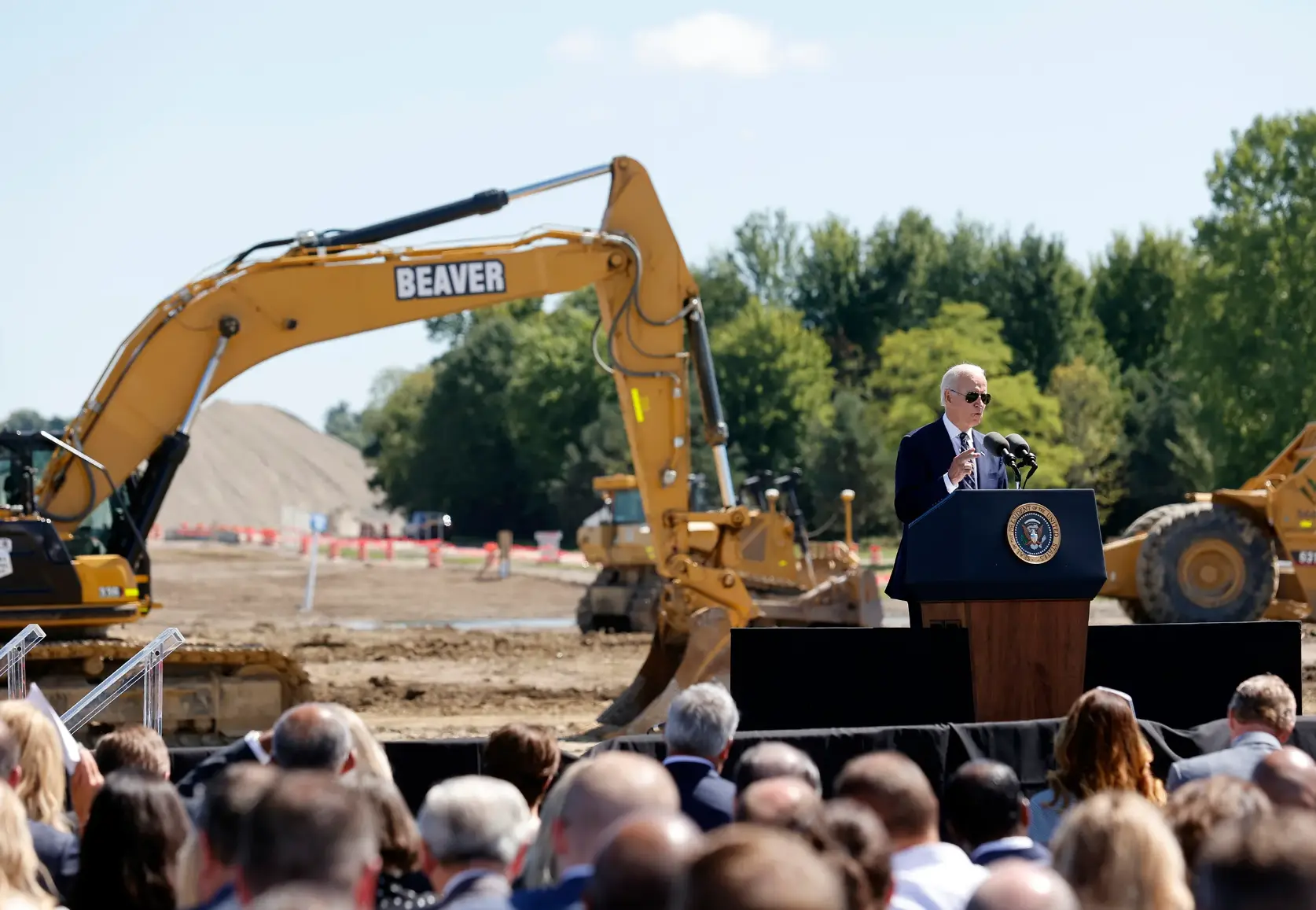trending
neon
Cirque du Soleil offers summer ticket deals
dining out
Celebs ditch the Strip for iconic Henderson restaurant
july 
trending
neon
Cirque du Soleil offers summer ticket deals
dining out
Celebs ditch the Strip for iconic Henderson restaurant
july 

The Biden-Harris administration has announced an additional $210 million in funding for tech hubs, aiming to boost innovation and foster economic growth across the U.S




The Biden-Harris administration has announced a landmark $210 million investment aimed at fostering the development of technology hubs across the United States. This additional funding is part of a broader push to strengthen the nation's technological infrastructure, drive innovation, and promote economic growth, particularly in areas that have historically been underrepresented in the tech industry.
Tech hubs play a critical role in advancing the U.S. economy by creating high-tech jobs, supporting startups, and spurring innovation across various sectors, including artificial intelligence, clean energy, cybersecurity, and biotechnology. The funding will help build infrastructure, provide grants, and support training programs in cities and regions across the country, enabling local economies to benefit from the technological advancements driving the global economy.
Tech hubs serve as epicenters for collaboration, where businesses, research institutions, and local governments come together to foster innovation. They also create networks that allow emerging companies to scale, making it easier for small businesses to access funding, mentorship, and resources to grow. In addition to economic growth, the expansion of tech hubs is seen as essential for addressing the technological skills gap in the U.S. workforce, ensuring that Americans have access to the training and education needed to thrive in a rapidly changing job market.
The $210 million in funding will be distributed across multiple tech hubs, with a particular emphasis on supporting underrepresented regions and communities. The goal is to create a more inclusive tech ecosystem that spans beyond traditional hubs like Silicon Valley, New York City, and Boston. By investing in areas such as the Midwest, South, and rural America, the administration aims to level the playing field and provide opportunities for communities that have not traditionally had access to cutting-edge technology and innovation resources.
The funds will support a range of initiatives, including grants to local governments, universities, and private sector partners. These grants will help develop research and development (R&D) infrastructure, build talent pipelines, and promote collaboration between businesses and academic institutions. Additionally, a portion of the funding will be used to create workforce development programs, focusing on upskilling workers in high-demand tech fields such as software engineering, data science, and cybersecurity.
This investment aligns with the Biden administration’s broader economic agenda, which prioritizes building back better by creating jobs, supporting small businesses, and investing in clean energy technologies. The administration views the expansion of tech hubs as a key component of this strategy, ensuring that all Americans benefit from the economic opportunities created by technological advancement.
The Biden-Harris administration has emphasized that the U.S. must remain competitive in the global tech race, especially as China and other nations continue to make significant strides in developing emerging technologies. By investing in domestic tech hubs, the administration hopes to ensure that the U.S. retains its leadership position in innovation and technological development.
The funding for tech hubs will also address the increasing demand for tech talent, which is critical for maintaining U.S. competitiveness in sectors like artificial intelligence, 5G, and quantum computing. As the demand for highly skilled workers in tech fields grows, the development of tech hubs will help train the next generation of leaders and innovators. This will also have the added benefit of reducing the outsourcing of tech jobs to other countries, helping to keep the U.S. workforce competitive on the global stage.
Furthermore, the expansion of tech hubs is seen as a way to promote economic resilience. By diversifying the geographic spread of tech innovation, the U.S. can reduce its reliance on a few concentrated regions, making the economy more adaptable to future technological disruptions and global challenges. Tech hubs in different parts of the country will help ensure that innovation is not just limited to a few major metropolitan areas but is instead spread throughout the nation.
One of the key objectives of the $210 million investment is to promote greater inclusivity in the U.S. tech ecosystem. Historically, the tech industry has been criticized for its lack of diversity, with women, minorities, and rural communities often being excluded from high-tech opportunities. The Biden-Harris administration has made it a priority to address these disparities and ensure that all Americans have an equal chance to succeed in the tech economy.
To this end, the funding will prioritize initiatives aimed at increasing diversity in tech. This includes scholarships and training programs for underrepresented groups, as well as efforts to support women in STEM fields. By building a more inclusive tech ecosystem, the administration hopes to ensure that the benefits of technological progress are shared more broadly across society, helping to reduce economic inequality and promote social mobility.
The expansion of tech hubs is also seen as a means of addressing the digital divide, ensuring that all Americans, regardless of their geographic location or socioeconomic background, have access to the tools and training they need to participate in the digital economy. By investing in rural and underserved communities, the Biden administration is working to create a more equitable tech landscape, where innovation is accessible to everyone.
The $210 million investment in tech hubs is just the beginning of what is expected to be a sustained effort by the Biden-Harris administration to revitalize U.S. technological infrastructure. As the country faces global challenges such as climate change, cybersecurity threats, and geopolitical competition, the development of domestic tech hubs will be a critical component of ensuring that the U.S. remains a leader in technological innovation.
By investing in tech hubs, the administration is not only creating jobs and supporting small businesses but also fostering the next generation of technologies that will shape the future of industries such as healthcare, energy, and transportation. The long-term impact of this funding will be felt across multiple sectors, helping to secure a brighter, more innovative future for the U.S. and its citizens
The Biden-Harris administration has announced an additional $210 million in funding for tech hubs, aiming to boost innovation and foster economic growth across the U.S
the latest

The Role of U.S. Technology in Global Economic Recovery Post-COVID
As the world recovers from the economic impact of COVID-19, U.S. technology companies are leading the way in digital transformation, AI-driven growth, and supply chain resilience. From cloud computing to biotech, innovations are shaping a stronger global economy

Big Tech Faces New Tax Proposals as Congress Pushes for Greater Contributions
Congress is pushing for new tax proposals aimed at Big Tech companies, seeking increased contributions to federal revenue. Lawmakers argue that major tech firms benefit from U.S. infrastructure but pay disproportionately low taxes. The proposed reforms could reshape corporate tax obligations in the digital economy

U.S. Invests in Cybersecurity Innovation to Strengthen National Security
The U.S. government is ramping up investments in cybersecurity innovation to protect national security. With rising cyber threats from foreign entities, the administration is allocating billions to strengthen defense systems, AI-driven security, and critical infrastructure protection.

Venture Capital Investments in Tech Reach Record Highs in 2025
Venture capital investments in the tech industry have reached record highs in 2025, driven by innovations in AI, blockchain, and green technology. Investors are pouring billions into startups, signaling confidence in the sector’s future growth

U.S. Tech Sector Faces Antitrust Scrutiny Amid Regulatory Crackdown
The U.S. tech sector is under heightened scrutiny as regulators and lawmakers ramp up antitrust investigations. Major tech companies face legal and regulatory challenges over market dominance, data privacy, and fair competition

Biden Administration's Funding Boosts Green Tech Startups
The Biden administration has announced significant funding initiatives to support green tech startups, aiming to accelerate the development and adoption of clean energy technologies.

Tech Industry Thrives Amid U.S. Regulatory Changes
The tech industry is seeing significant growth as the U.S. government introduces new regulatory changes aimed at fostering innovation while ensuring ethical practices. This shift is expected to create new opportunities and challenges for tech companies in 2025

Chinese AI App Sparks US National Security Concerns
A new powerful AI app developed in China is causing concerns in Washington due to its potential impact on national security, data privacy, and economic competition. US officials are closely monitoring its development

Stargate AI Project: Tech Giants Launch $500bn Investment
Major tech giants have unveiled the Stargate AI project, a groundbreaking initiative that could be worth up to $500 billion. The ambitious plan aims to reshape the future of AI